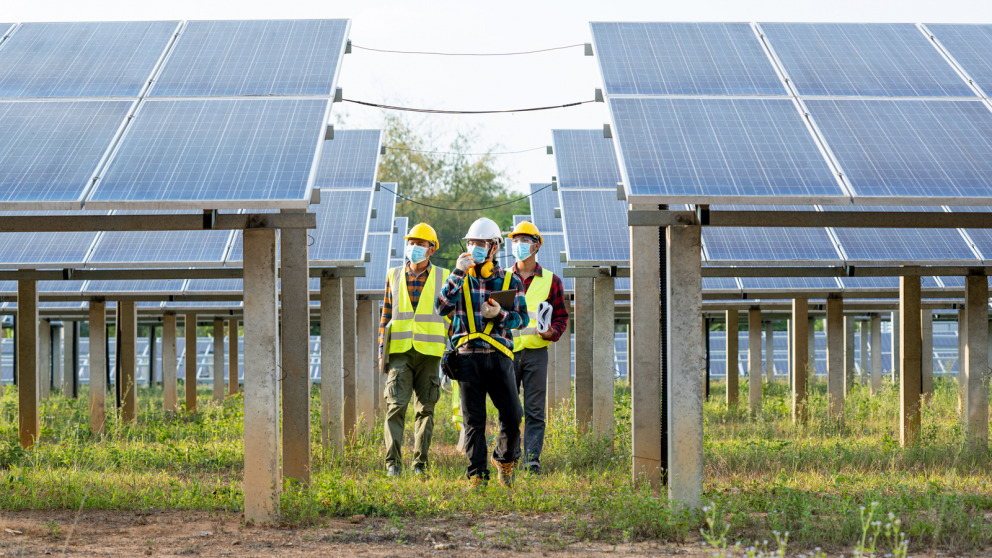Pandemic Exacerbates Challenges for International Energy Transition
23.03.2021
The Covid-19 Crisis is deepening the divide between energy transition frontrunners and laggards. In a new publication, researchers from the Institute for Advanced Sustainability Studies (IASS) in Potsdam present an overview of the global impact of the coronavirus pandemic on the energy sector. Their findings show that low- and middle-income countries need more support in their efforts to ditch fossil fuels.

The crisis will heighten existing imbalances in an uneven energy transition landscape. Despite the crisis, frontrunners in the global energy transition will continue to expand their renewable energy capacities, while laggards will fall further behind. In Europe, the Green Deal is having an effect and has even encouraged an otherwise sluggish Poland to accelerate its incipient energy transition. In low- and middle-income countries, on the other hand, the pandemic is exacerbating financing challenges and hampering investment in renewable energy infrastructure. This is particularly evident in Latin America, where all auctioning activity in the renewable power sector has ceased. In a number of G20 countries, pandemic-related financial support for fossil fuel industries has dampened efforts to support renewable energies.
Crisis has deepened dependency on fossil fuels
In countries whose economies are heavily dependent on fossil fuels, governments have pledged significant support to these sectors, further entrenching existing dependencies. In Indonesia, for example, the government has chosen to support the country's coal industry with tax breaks and by lowering regulatory requirements, while plans to replace older, fossil-fuelled power plants with renewable energy solutions have been scaled back.
However, aid for the fossil energy industry does not always go hand in hand with a slowdown in the transition to clean energy, explains lead author Rainer Quitzow: "In some large countries, our observations suggest contradictory trends. The USA and Canada, both major oil and gas exporters, were hit hard by the collapse in demand, with the governments of both countries pledging to support the fossil sector. However, it seems unlikely that this will slow the growth of renewables in these countries for the time being, as energy transition pioneers like California continue to move away from fossil fuels." In China, provincial governments have opted to prioritize investment in coal-fired power plants and oil refineries, while the central government has continued to increase its growth targets for the clean energy sector.
In the Global South, the crisis has added to the challenges presented by an already difficult investment climate for clean energy projects. On the one hand, falling government revenues are raising concerns about the sustainability of public debt burdens, leading to a depreciation of currencies and increased borrowing costs. Since renewable energies are particularly capital-intensive, this disproportionately affects investments in renewables. On the other hand, economic hardship related to the pandemic is leading to a rise in defaults on consumer electricity bills. In several countries, governments have responded by reducing electricity prices or suspending the billing of residential electricity consumers. This puts additional pressure on the utility sectors in these countries, adding to investment risks in the power sector.
Global Green Deal could raise ambitions
Science and policymakers must double their efforts to support transitions to a clean energy future in the least developed countries, explains Quitzow: "It is high time that the plight of fossil-fuel dependent economies is addressed at the international level. The Covid-19 crisis has underlined the urgent need to develop programmes similar to the European Green Deal in fossil fuel-dependent countries and regions around the world. This will require the development of new international partnerships and financing arrangements that are explicitly tailored to the challenges of fossil-fuel dependent regions." A concerted international effort is needed to confront the twin challenges of economic recovery and the global fight against climate change.
Publication:
Quitzow, R., Bersalli, G., Eicke, L., Jahn, J., Lilliestam, J., Lira, F., Marian, A., Süsser, D., Thapar, S., Weko, S., Williams, S., Xue, B. (2021): The COVID-19 crisis deepens the gulf between leaders and laggards in the global energy transition. - Energy Research and Social Science, 74, 101981. https://doi.org/10.1016/j.erss.2021.101981
Media
Rainer Quitzow on COVID-19 and the Global Energy Transition

Contact

